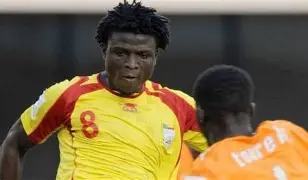Nigerian-born Beninese international striker Razak Omotoyossi has died at the age of 39.
Authorities in Benin confirmed his death on Tuesday, August 19, plunging the West African football community into mourning.
Reacting to the tragic news, Swedish club Helsingborgs IF, where Omotoyossi once starred, paid tribute to their former player on X.
“Helsingborgs IF is in mourning. We have been informed that our former player Razak Omotoyossi has passed away at the age of 39. Our thoughts are with his family and loved ones,” the club wrote.
Nigerian journalist Shina Oludare also confirmed the development after reaching out to the late striker’s brother, who disclosed that Omotoyossi had been battling depression and illness.
READ ALSO: Just In: Legendary Super Eagles Goalkeeper Peter Rufai Is Dead
Oludare wrote: “Razak Omotoyossi’s brother tells me that the former Benin Republic legend had been battling depression and illness, which contributed to his passing… For context, he tragically lost his home to a fire in July, and just two weeks ago, his sister also did.”
Born in Lagos, Nigeria, Omotoyossi switched allegiance to Benin after starting his career in the Nigerian league. He went on to become one of the nation’s most iconic footballers, earning 55 caps and scoring 21 goals for the Squirrels.
He etched his name into history during the 2008 Africa Cup of Nations (AFCON) qualifiers, where he scored all four goals in Benin’s famous 4-1 win over Togo, finishing the campaign as joint top scorer alongside Cameroon’s Samuel Eto’o. He later became the first player ever to score for Benin at the AFCON finals.
READ ALSO: Former Super Eagles Captain, Coach Christian Chukwu Dies At 74
At the club level, Omotoyossi had a storied career across Africa, Europe, and the Middle East, featuring for sides in South Africa, Libya, Egypt, Syria, Moldova, Sweden, and France.
His most memorable spell came with Helsingborgs IF in Sweden, where he played in the UEFA Champions League before moving to French Ligue 1 side FC Metz.
Tributes continue to pour in for Omotoyossi, who is remembered as not only a football icon but also a symbol of Benin’s rise in African football.
